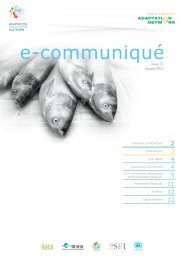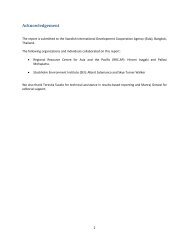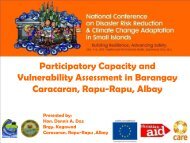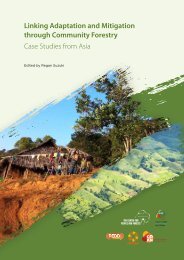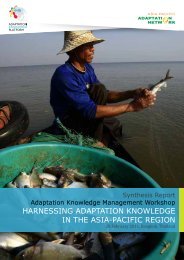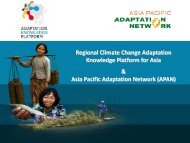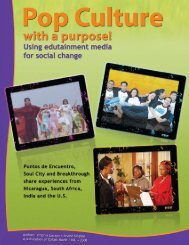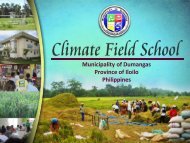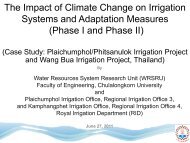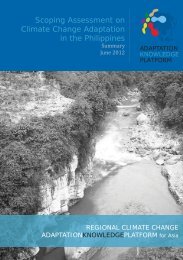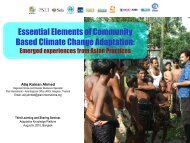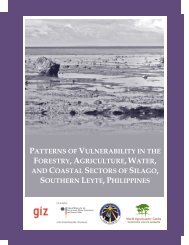Desktop Study on - Regional Climate Change Adaptation ...
Desktop Study on - Regional Climate Change Adaptation ...
Desktop Study on - Regional Climate Change Adaptation ...
Create successful ePaper yourself
Turn your PDF publications into a flip-book with our unique Google optimized e-Paper software.
<str<strong>on</strong>g>Desktop</str<strong>on</strong>g> <str<strong>on</strong>g>Study</str<strong>on</strong>g><br />
to involve the different stakeholders,<br />
especially those who are directly affected<br />
by climate-related events, to ensure the<br />
accuracy of the vulnerability index.<br />
The variables identified in the regressi<strong>on</strong><br />
model used in the study of PCW, namely,<br />
ethnic affiliati<strong>on</strong>, household size, m<strong>on</strong>thly<br />
food c<strong>on</strong>sumpti<strong>on</strong>, and farm distance to<br />
market were found insufficient to analyse<br />
household’s vulnerability. An average of<br />
approximately 55% of the vulnerability<br />
variance based <strong>on</strong> the weights provided<br />
by both researchers and the local<br />
communities were unaccounted for <strong>on</strong> an<br />
aggregate level (Lasco, 2006).<br />
Many studies <strong>on</strong> climate change impacts<br />
and adaptati<strong>on</strong> in the forest, agriculture<br />
and water resources sectors have reported that<br />
there exists a fragmented approach as well as a<br />
disc<strong>on</strong>necti<strong>on</strong> between local planning and actual<br />
adaptati<strong>on</strong> strategies and also inspected the lack of<br />
interdisciplinary partnership in research projects<br />
that could assist in more holistic analysis and findings<br />
<strong>on</strong> adaptati<strong>on</strong> processes (Penalba et al., 2007, Allen,<br />
2006, Capili, Ibay and Villarin, 2005, Castillo et<br />
al.,2008, and Sales, 2008, cited in Resurrecci<strong>on</strong> et al.,<br />
2008).<br />
Governance Gaps<br />
Lack of enabling nati<strong>on</strong>al policies and instituti<strong>on</strong>al<br />
support to enhance adaptive capacity to reduce<br />
climate change impacts appears to have prevented<br />
the local communities from making efforts to reduce<br />
biological as well as socio-ec<strong>on</strong>omic vulnerability.<br />
For example, the forest policy does not allow<br />
timber harvesting in watershed areas in which the<br />
communities are already involved in the projects<br />
of plantati<strong>on</strong> establishment (Lasco, 2006). Lack of<br />
direct access to natural resources and limited sources<br />
of livelihood opportunities, community members are<br />
forced to get involved in illegal logging and charcoalmaking<br />
, which has resulted in degradati<strong>on</strong> of the<br />
watershed c<strong>on</strong>tributing to biological vulnerability.<br />
There is no instituti<strong>on</strong>al support to build the capacity<br />
of the local communities to anticipate the occurrence<br />
of variables and extreme climate events. The lack<br />
of assessing policy-planning processes based <strong>on</strong><br />
behavioural analysis <strong>on</strong> policy-makers might affect<br />
the extent of vulnerability of local communities to<br />
climate change because vulnerability is an outcome<br />
not <strong>on</strong>ly of decisi<strong>on</strong> processes of the communities<br />
but also of the resp<strong>on</strong>ses of policy makers to certain<br />
opportunities or risks faced by climate change<br />
(Acosta-Michlik and Espald<strong>on</strong> 2008).<br />
Figure 20: Operati<strong>on</strong>al set-up of Presidential Task<br />
Force <strong>on</strong> <strong>Climate</strong> <strong>Change</strong> (Envir<strong>on</strong>mental<br />
Management Bureau, 2007)<br />
DBM<br />
Presidential Task Force <strong>on</strong> <strong>Climate</strong> <strong>Change</strong> (PTCC)<br />
Operati<strong>on</strong>al Set-up<br />
Capacity Gaps<br />
The study <strong>on</strong> people’s vulnerability points that<br />
a sense of dependency for external assistance,<br />
rather than the culture of self-reliance has been<br />
built through the l<strong>on</strong>g-term socio-political process<br />
started from 1971 to the present, whereby the chain<br />
of development projects have been implemented<br />
(Lasco, 2006). Such resettlement projects were little<br />
intended towards building capacities of the local<br />
communities to increase resilience from climate<br />
change impacts.<br />
The capacity of the poor community to increase<br />
resilience from climate change impacts remains low<br />
due to the prevailing inequitable social structure<br />
especially in PCW (Lasco, 2006). This is reflected<br />
by the community’s own typology of small, average<br />
and rich farmers. Given that enhancing the adaptive<br />
capacity is associated with availability of, access<br />
to and c<strong>on</strong>trol over productive resources, the<br />
prevailing inequality that embodies the Philippine<br />
social structure is a crucial issue to tackle as a root<br />
cause.<br />
CROSS-SECTORAL<br />
INSTITUTIONAL SETTINGS<br />
<strong>Climate</strong> <strong>Change</strong><br />
PTFCC All Agencies /<br />
GOCCs<br />
IACCC<br />
(Technical Support<br />
Secretariat /<br />
DENR<br />
Current Instituti<strong>on</strong>al settings for<br />
<strong>Climate</strong> <strong>Change</strong> Related Activities<br />
The Philippines was <strong>on</strong>e of the earliest countries to<br />
address the challenges of climate change. In 1999,<br />
the country submitted to the UNFCCC an Initial<br />
Nati<strong>on</strong>al Communicati<strong>on</strong> <strong>on</strong> <strong>Climate</strong> <strong>Change</strong>. Since<br />
the preparati<strong>on</strong> time for the ratificati<strong>on</strong> of UNFCCC,<br />
64



